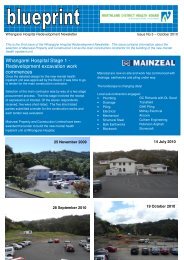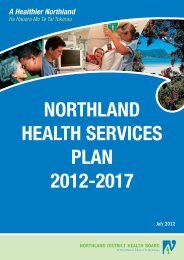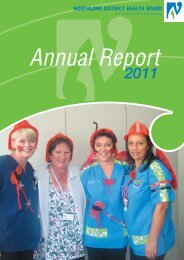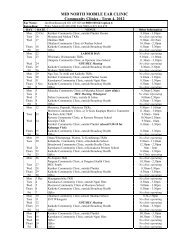E22 A4 Annual Report 2010 FP.indd - Northland District Health Board
E22 A4 Annual Report 2010 FP.indd - Northland District Health Board
E22 A4 Annual Report 2010 FP.indd - Northland District Health Board
You also want an ePaper? Increase the reach of your titles
YUMPU automatically turns print PDFs into web optimized ePapers that Google loves.
coordinating the development of the regional service plan for <strong>2010</strong>/11.<br />
The plan due at the end of September <strong>2010</strong>, will describe the many and<br />
varied streams of work being undertaken across the northern region. This<br />
plan will become the medium-term (5-10 years) accountability document for<br />
northern district health boards, and will have a strategic focus on intended<br />
service confi guration and models of care, and will identify short term<br />
implementation actions.<br />
The intention of the northern district health boards is to work together more<br />
effectively, at a regional level to make better use of available resources<br />
(workforce, funding, capital and IT), strengthen clinical and fi nancial<br />
sustainability, and improve equity of access across the region.<br />
Regional Detoxifi cation Unit<br />
<strong>Northland</strong> DHB’s Mental <strong>Health</strong> and Addiction Service recently opened<br />
a new <strong>Northland</strong> regional detoxifi cation unit called Timatanga Hou or<br />
New Beginnings, to support existing mental health services and addiction<br />
services in the region. Located at Dargaville Hospital, the new three bed<br />
unit provides 24-hour care, counselling and treatment programmes. To<br />
date, the main indicators for admission to this unit are alcohol, followed by<br />
cannabis and methamphetamine addiction.<br />
Regional Sub Acute Inpatient Unit<br />
A new regional sub acute inpatient unit is due to open in Kaikohe on 1<br />
July <strong>2010</strong>. The unit will be part of <strong>Northland</strong> DHB’s Mental <strong>Health</strong> and<br />
Addictions Service and will provide intensive six week rehabilitation care<br />
and treatment to clients / tangata whaiora, aged between 18 years to 65<br />
years, who reside in the Mid North <strong>District</strong>.<br />
Based on a similar sub acute unit in Kaitaia, the new facility will support<br />
mental health and addictions clients that need more intensive support than<br />
their usual environment can offer. <strong>Northland</strong> DHB staff will be on-site to<br />
provide 24 hours a day, seven days a week care and observation, with<br />
visitors permitted, as and when appropriate.<br />
Recidivist Drink Driver Programme<br />
<strong>Northland</strong> DHB’s Alcohol and Drug Service have been piloting a programme<br />
for Recidivist Drink Drivers since June 2007. The pilot began due to an<br />
increased number of referrals from the Justice Department for Recidivist Drink<br />
Driving offenders to engage in treatment.<br />
The aim of the programme is to reduce recidivist drink driving, address the<br />
level of binge drinking or dependence and provide strategies for reducing<br />
alcohol consumption levels. The programme is psycho-educational and<br />
includes elements of motivational interviewing, cognitive behavioural<br />
therapy, relapse prevention, problem solving theories and victim empathy.<br />
Overall the programme has made an impact, reducing the amount of<br />
alcohol consumed and the rates of re-offending for participants who have<br />
completed the programme. A proposal has been submitted to RoadSafe<br />
<strong>Northland</strong> for funding to support the extension of the programme across<br />
<strong>Northland</strong>.<br />
A proposal has also been prepared for presentation to the <strong>Northland</strong><br />
Intersectoral Forum (NIF) with the aim of securing facilitators from other<br />
organisations to work in partnership with alcohol and drug counsellors to<br />
deliver the programme.<br />
<strong>Northland</strong> Intersectoral Forum (NIF)<br />
In early March 2002 a forum was held in Whangarei, chaired by<br />
the Mayoral Forum and run in conjunction with the Ministry of Social<br />
Development. Some 25 representatives from the government and community<br />
attended the meeting which included facilitated workshops.<br />
The fi rst action identifi ed following the meeting was the establishment of a<br />
collaborative networking mechanism that would ensure that the Mayoral<br />
Forum and the government agency representatives worked closely together<br />
on an ongoing basis.<br />
As a result, the <strong>Northland</strong> Interagency Forum (NIF) was established. The<br />
NIF consists of the chief executive of the <strong>Northland</strong> DHB and Regional<br />
Managers of Work and Income, Police, Housing, Community Employment,<br />
Te Puni K kiri, Child Youth and Family, Ministry of Education and the chief<br />
executive of Enterprise <strong>Northland</strong> who provides the link between the<br />
economic and social strategies.<br />
Since the establishment of the group, it has spent time looking at what is<br />
already under way across <strong>Northland</strong> and has identifi ed where it can add<br />
value. The Forum developed a Strategic Plan for<br />
<strong>2010</strong> – 2012, which refl ects the Forum’s collective priorities across four<br />
elements: social, environmental, cultural and economic.<br />
Benefi ts of collaboration include:<br />
• The establishment of the Far North Alcohol Team (FNAT) by <strong>Northland</strong><br />
DHB, New Zealand Police and the Far North <strong>District</strong> Council,<br />
co-locating and integrating working on alcohol in the Mid and Far<br />
North undertaking a wide range of activities. After a focus on<br />
licensed premises, alcohol-fuelled violence where the last drink was at<br />
a licensed premise prior to offending has dropped by over twothirds.<br />
• “The Pulse” located in Raumanga brings government and non<br />
government agencies together to meet the needs of youth in the<br />
Raumanga and wider Whangarei area. The collective approach has<br />
attracted a range of national interest and there is strong agency buy-in<br />
and support. The Pulse is utilised for a range of events, including<br />
Children’s Day <strong>2010</strong>.<br />
• Child Youth and Family and <strong>Northland</strong> DHB are able to discuss mutual<br />
cases, and be proactive in supporting staff to work together better.<br />
Whanau Ora<br />
Earlier this year, Whanau Ora was launched as an inclusive approach<br />
to providing services and opportunities to families across New Zealand.<br />
The primary focus of this new initiative is on achieving best outcomes for<br />
whanau through the development of whanau leadership and integrated<br />
whanau-centred service delivery.<br />
To support the implementation of Whanau Ora, a national governance group<br />
provides strategic advice on policy priorities and ensures coordination across<br />
government agencies and key stakeholders. The governance group’s role is<br />
to facilitate the implementation of Whanau Ora. It does this through advice<br />
to the Minister Responsible for Whanau Ora and providing leadership and<br />
co-ordination across government agencies and stakeholders.<br />
The <strong>Northland</strong> regional leadership group provide recommendations to<br />
the Whanau Ora Governance Group on the selection of Whanau Ora<br />
service providers and the development and implementation of programmes<br />
and initiatives. The group includes between three and seven community<br />
representatives and offi cials of Te Puni K kiri, Ministry of Social Development<br />
and <strong>Northland</strong> DHB.<br />
PRIMARY HEALTH CARE ACTIONS<br />
Clinical Director Primary <strong>Health</strong> Care<br />
Clinical governance at a primary health care level is a necessary requirement<br />
for primary health organisations. In <strong>Northland</strong> the role of clinical director<br />
primary health care originally sat within the district health board’s service<br />
development and funding team. The opportunity arose to relocate this<br />
position within primary health care with the aim of linking more actively with<br />
those at the frontline of primary care and providing a strong primary health<br />
voice in <strong>Northland</strong> DHB strategic developments, and to complement the<br />
role of the two general practitioner liaison clinicians.<br />
Te Tai Tokerau PHO agreed to act as the lead primary health organisations<br />
on behalf of the then six <strong>Northland</strong> primary health organisations. Dr Russell<br />
Smart was appointed as the primary health care clinical director on 1<br />
August 2009. Dr Smart works on four tenths basis, and utilises several<br />
bases around <strong>Northland</strong> to maximise links with general practitioners in the<br />
various <strong>Northland</strong> localities.<br />
Shifting Services from Secondary to Primary Care<br />
In March 2009, Government indicated its intention that planning should<br />
23






